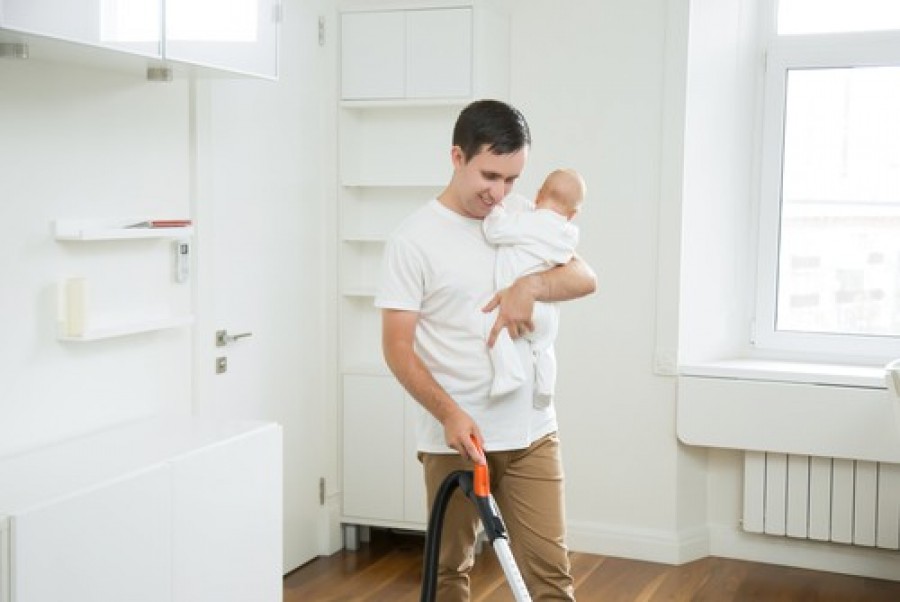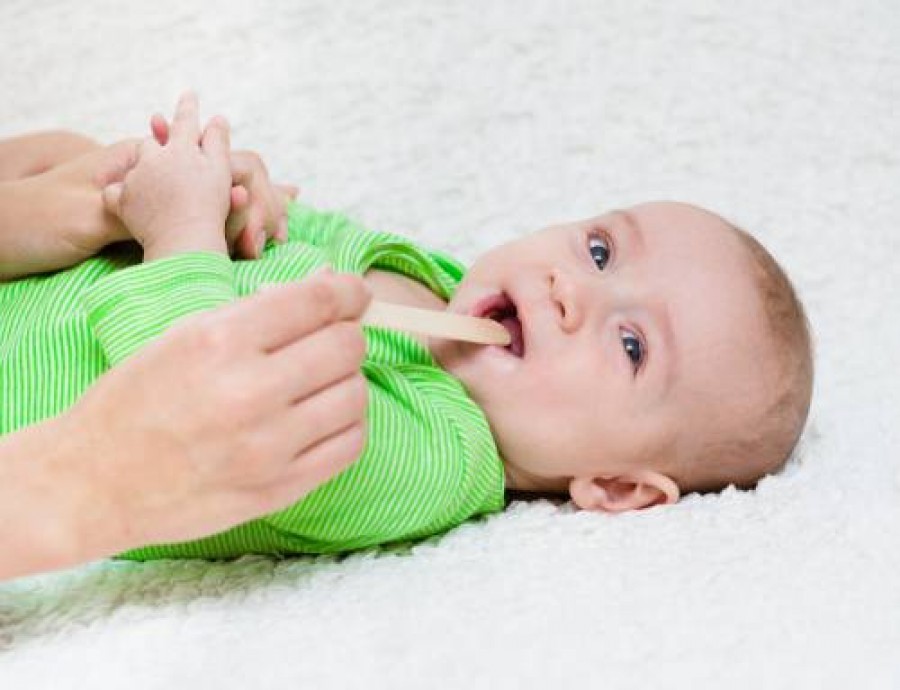Stay at Home Dads: Why this should be the new norm

When fathers of new babies head off to work each day, they usually feel comfortable in the knowledge that their little ones are being well cared for; because they left their baby with its mother.
Most of the time when mothers go off to work, they leave their babies in childcare, so don’t have the same immediately comfortable confidence that their little ones are in the very best of care. This extra worry can make going back to work hard for working mums.
But what if the baby was left with Dad? Mum could return to work safely knowing Bubs is in excellent hands and would then be able to focus entirely on their jobs.
Or at least this is how I imagine Heaven looks in my head.
Why do the Dads get to go off to work guilt-free, yet when the mothers go too they are racked with guilt? There is one perfect solution to this problem; Dad stays home while Mum goes to work!
While I admit a lot of the neurosis and guilt of being a working mum could just be mine, I think every mum would love a stay at home Dad! Thankfully it is becoming more and more common, but still has a bit of a way to go before it has become the norm.
How many Dads are staying at home?
Australian Bureau of Statistics results indicated that between 2003 and 2013, the number of stay at home Dad families doubled, from around 50,000 to 100,000.
While these figures were promising, the numbers seem to have plateaued, with ABS results last year saying the number was still the same. With stay at home Dad arrangements only making up 4% of two-parent families with dependent children, we still have a long way to go.
When interviewed, families across the board were supportive of the concept of the stay at home Dad, but very few of us seem to able to put that progressive thinking into reality.
Why having a stay at home Dad is a great idea!
For the Mum
When today’s’ working mothers in Australia retire, they will have around half of the superannuation that their male counterparts have. This is due to the years of maternity leave, and years of part-time work, or no work, that they undertake because they are raising the children. The majority of families have mothers taking on the greater burden of the childcare and looking after the home.
This difference in superannuation might not matter so much if husbands and wives retire together and divide their super evenly and live happily ever after. But many women end up retiring alone, either because of marriage breakdown or because men on average do not live as long, and by this point, the numbers are starting to look really concerning for us girls.
If the mother and father take equal amounts of time off to be responsible for raising the children, both careers will be in much better shape. Women will spend less time out of the workplace overall and will be less likely to fall behind in industry developments, professional training,and career advancement.
And while their careers are on track, they feel better able to focus on work when they are there, because their baby is being well looked after. The working mother’s stress levels are lower and their emotional and mental health is better than when both parents are working.
If mothers are thinking that returning to work will lessen their bond with their baby, these worries seem to be unfounded. Research shows that children whose mother’s work do not form weaker bonds with their mothers.
For the Dad
More and more Dads are finding that spending a year or three at home with the children, instead of in the workforce is actually quite a good idea.
For Thomas and his wife Anna, it made sense because she ran her own pharmacy, while he was a secondary teacher, and it was easier for him to get time off. Plus, possibly because he was a teacher, he found he was a natural at being the stay at home Dad.
Dads who stay home get to know their children better, building stronger bonds and stronger communication with their children in their formative years.
When you talk to the Dads who are doing this, they are overwhelmingly happy with the situation and say that working Dads they talk to want what they have.
These fathers tell how they appreciate having time with their kids, and say that when they are all grown up, it will be too late to regret not having had that time. As the old saying goes, no-one ever lies on their deathbed and wishes they had spent more time at work.
For the children
The quality of care the child receives is the same regardless of if Mum or Dad is the parent that stays at home. And most children will love to look back and have had that relationship with their father, in a society where fathers still overwhelmingly leave the home to work.
A father’s parenting style is quite different to a mother’s, and children who get equal amounts of both have been shown to flourish emotionally, cognitively, behaviourally and developmentally. One of the key factors in children developing empathy tends to come from what they are modelled by their fathers.
And boys who see their fathers taking an equal childcare role are more likely to be progressive thinkers and compassionate adults themselves.
What are some of the drawbacks of the stay at home Dad?
Sometimes naysayers have things to say. I don’t recommend listening to them, but it is hard to ignore them completely.
At the moment it seems to take a confident man to become a stay at home Dad. While all the Mums at the playground and school pick up and swimming lessons are pretty happy to see a Dad there from time to time, that Dad may not be getting quite the respect he deserves.
His working mates and former colleagues may question the decision to take time at home, and the more conservative or traditional members of the older generation may raise their eyebrows a little as well.
‘I had my parents asking why I was staying home,’ said Andrew, one stay at home Dad, ‘They were concerned that I had been made redundant, or that I would be if I wasn’t careful’
‘I am constantly asked if I am babysitting,’ said Nathan, who is the primary carer for his boys aged 3 and 5, ‘And when my son’s teacher needed to discuss something, she asked when his mother would be available, as though I couldn’t make decisions about my son on my own.’
Fathers who stay home can be a bit more isolated than stay at home Mums because they have fewer peers. Fathers are less likely to join in Mother’s Groups (perhaps because they are called Mother’s Groups!) and playgroups, although many will still connect with other parents at the park and at children’s activities.
Stay at home Dads have fewer people they can talk with who know exactly what they are going through, and less social supports during the day if trouble arises than women do. Women tend to be better at asking for help as well, so it may be that Dads are isolated because they are more reluctant to reach out to other primary carers for peer support.
Studies show that in families where the Dad stays home, the Mum still does quite a large portion of the housework and childcare. Even in those awesome families that are managing the new arrangements, the work/home balance of work is not very evenly split.
When there is a stay at home Dad, and the Mum does the bulk of work outside the home, on average she still spends more hours per week looking after the children than the father does. Also, she only spends five hours less a week on housework than her full-time househubby.
These figures are not coming off as just and fair, and don’t seem to be supporting the argument for women to go back to work to lessen their load.
When does the stay at home Dad experiment work best?
For most families, it is more a financial choice than a preferential or practical one as to who takes on what role. For most couples, the male has a higher earning capacity, so it makes better financial sense for him to work full-time.
History tends to show that the happiest babies are the ones whose parents love what they are doing. If their mother stays home when she wants to be working or puts her baby in care when she isn’t comfortable with it, and she is miserable, her baby can tell.
If Dad loves staying home and Mum loves working, then there is an easy solution; stick with this plan! Do what feels best for you as a couple and a family, and never mind what the naysayers say about it. Soon, if I have anything to say about it, it will definitely be the new norm!
The best advice may be to follow your instincts and do what feels right for you, regardless of what society has to say about it.


